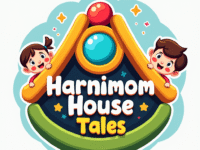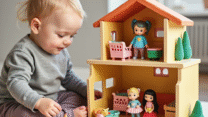
How to Handle Frustration in Toddlers (Without Losing Your Mind)
Introduction: We’ve All Been There
You’re at the grocery store. Your toddler wants to carry the apples. You gently say no, and the next thing you know—apples are rolling across the floor while your little one melts down in front of a small crowd.
Sound familiar?
If you’re a parent of a toddler, frustration—theirs and yours—is a daily guest in your home. But here’s the truth: frustration isn’t bad. It’s a normal, necessary part of development. What matters is how we respond to it.
Let’s walk through it together, step by step—from what’s happening in their little brains to what we can do in the moment and beyond.

Why Are Toddlers So Easily Frustrated?
1. Their Brain Is Still Developing
Toddlers are operating with a rapidly developing but very immature brain. The prefrontal cortex, which handles impulse control, patience, and problem-solving, is still under construction.
When something doesn’t go their way, they don’t have the tools to cope. So, they scream, cry, hit, or throw.
2. They Have Big Feelings, Tiny Words
Imagine feeling deeply upset and not having the words to express it. That’s the toddler experience. Their language skills lag behind their emotions, which leads to explosive outbursts.
3. They Crave Control—but Don’t Know Limits
Toddlers are just beginning to understand they’re separate people with power. They want to do things their way, but they quickly discover they can’t always have what they want—and that mismatch leads to frustration.
What NOT to Do When Your Toddler Is Frustrated
We’ve all made these mistakes (myself included). Awareness is the first step toward changing them.
- Don’t yell back – It only escalates the situation.
- Don’t punish the feeling – Frustration is valid; what matters is how it’s expressed.
- Don’t solve everything for them – They need chances to learn how to cope.
So What Should You Do Instead?
1. Stay Calm Yourself (Even If You’re Faking It at First)
Your calm nervous system helps regulate theirs. Think of it like co-piloting a tiny, emotional airplane. If you panic, they spiral. If you breathe deeply, they start to steady.
💡 Tip: Try saying softly, “You’re having a hard time. I’m right here.” That alone can begin to calm their brain.
2. Name the Feeling
Use simple words to help them understand what’s happening inside them:
“You’re frustrated because your tower fell down.”
This helps toddlers build emotional vocabulary and feel seen.
3. Offer Choices When Possible
Sometimes frustration comes from feeling powerless. Offering small, safe choices can reduce meltdowns:
“You can wear the red socks or the blue ones.”
“Do you want to clean up now or in five minutes?”
These give toddlers a sense of control without giving in to every demand.
4. Teach Calm-Down Tools (in the Moment & Outside of It)
Toddlers aren’t born knowing how to self-soothe. We have to teach them, gently and repeatedly.
Try these:
- Deep belly breaths: “Smell the flower, blow out the candle.”
- Squeezing a soft toy or playdough
- Jumping up and down to release energy
- Counting to 5 together
- Saying “I need a break” (model this often)
What to Do After the Outburst
Once the storm passes, that’s when real learning happens.
1. Revisit the Moment Calmly
When everyone is calm, talk about what happened.
“You were really frustrated. Next time, let’s try using your words or taking a deep breath.”
Don’t make it a lecture. Keep it brief, warm, and constructive.
2. Celebrate the Tiny Wins
If they even try to express frustration differently—acknowledge it!
“You told me you were mad instead of hitting. That was amazing!”
Praise builds confidence in handling big emotions.
Building Long-Term Frustration Tolerance
Helping toddlers in the moment is crucial. But the goal is long-term: teaching resilience and coping skills they’ll use for life.
Here’s how you can nurture that:
– Encourage Problem-Solving
When something’s hard, resist jumping in too quickly.
“That puzzle is tricky. What’s another piece you could try?”
-Model Managing Your Own Frustration
Let them see you get frustrated—and handle it well.
“I’m feeling upset because I spilled the milk. I’m going to take a breath and clean it up.”
– Set Predictable Routines
Toddlers thrive on predictability. It reduces stress and lowers frustration triggers.
– Allow Safe Struggles
Let them experience mild frustration and work through it. That’s how they build grit.
When to Be Concerned
Most frustration is developmentally normal, but keep an eye out if:
- Your toddler gets aggressive often and can’t calm down
- Their frustration interferes with daily life consistently
- They’re not meeting basic communication or behavioral milestones
Always trust your gut. If something feels off, it’s okay to talk to a pediatrician or child therapist.
Final Thoughts: You’re Doing Better Than You Think
You’re not a bad parent if your toddler melts down. You’re not failing if your child throws a shoe in frustration.
You’re raising a tiny human who’s just learning how to exist in a big, complex world. And every time you stay patient, name a feeling, or model calmness—you’re rewiring their brain for emotional strength.
Keep showing up. Keep breathing through it. You’re their safe space—and that’s what matters most.
Related Posts:














Leave a Reply